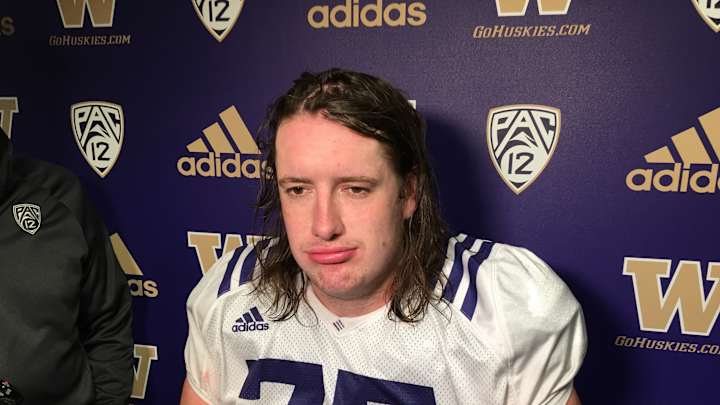Feeling Unwanted: Trey Adams, Four UW Teammates Go Undrafted

OK Trey, if there was one thing you could change about yourself, what would that be?
Yes, getting drafted.
While Jacob Eason and Nick Harris were able to find pro football homes, maybe later than they preferred, Washington offensive tackle Trey Adams on Saturday suffered the indignity of not having his name called at all in the NFL draft.
He shared that unwanted distinction with teammates Hunter Bryant, Salvon Ahmed, Aaron Fuller and Myles Bryant.
For Adams, his omission from this badge-of-honor player dispersal was most telling.
Two years ago, the 6-foot-8, 314-pound lineman from Wenatchee, Washington, saw a series of injuries transform him from possibly the Pac-12's top NFL prospect and a surefire first-rounder entering the 2018 season into someone who was left holding the TV remote control with an empty feeling.
In a cruel bit of irony, Adams and Hunter Bryant skipped the Huskies' matchup against Boise State at the Las Vegas Bowl last December to protect their pro football interests.
Then there was Ahmed, who, similar to Hunter Bryant, bypassed his senior year of eligibility with the Huskies to pursue the pros.
While all of these guys still can sign as free agents and convince the league an injustice was done by not drafting them, the neglected Huskies, to a man, have to feel huge disappointment after being ignored during the three-day event.
Adams, who appeared as lean as a tight end as a UW sophomore, lost his elite quickness and athleticism after having knee and back surgeries. He simply was no longer the same player.
People noticed. While Adams was named first-team All-Pac-12 by the conference, likely more on reputation than performance, Pro Football Focus completely left him off their all-league team.
He was invited to the NFL combine in Indianapolis, but scored the worst numbers of any participant in the running and jumping exercises. He also did himself a great disservice by offering a crude answer to a combine question that went viral.
Bryant watched 11 tight ends drafted over three days, including a pair from the Pac-12: UCLA's Devin Asiaasi, who went to the Las Vegas Raiders with pick No. 91 and Stanford's Colby Parkinson, who was taken at No. 133 by the hometown Seattle Seahawks.
That didn't seem right, considering that Bryant was named the first-team All-Pac-12 tight end and had a productive season.
A final insult in the draft had to be the hometown Seahawks taking LSU's Stephen Sullivan with the 251st pick, picking up a wide receiver only now making the conversion to tight end.
Pro talent scouts had no issues with Bryant's receiving skills -- he caught 52 passes for 825 yards and 3 touchdowns -- but they questioned his size and blocking abilities. They also likely were turned off by his fragile knees, with two serious injuries at the UW costing him most of two seasons.
At 6-foot-2 and 242 pounds, Bryant was considered undersized, though his proponents noted how he brought something different as a hybrid receiver, as someone with breakaway ability.
Coming into the draft, Bryant was considered a third- to a fifth-round selection in most mock drafts. He was listed as high as 72nd (Sporting News).
Ahmed was invited to the combine but drew very little traction with the draft analysts. He possesses elite speed, as his 89-yard touchdown run against USC demonstrated, but was rated mediocre when running between the tackles.
Had he returned for his senior year, Ahmed might have had trouble beating out Richard Newton, his backup and a physical runner the pros desire.
Fuller and Myles Bryant likewise were considered middle-of-the-road talents, both on the smallish side, and were never going to get drafted.
Overall, the Pac-12 fared poorly as a league, offering just 32 of the 255 of the players drafted.
Utah had the most players selected with seven, followed by Oregon with four. Oregon State, Colorado, California and UCLA each had three draftees.
Same as Washington, ASU and Stanford, USC surprisingly provided just two draft picks. The Trojans had two among the top 34 players and no more.
Washington State supplied just one draft pick while Arizona had none.

Dan Raley has worked for the Seattle Post-Intelligencer, Atlanta Journal-Constitution and Fairbanks Daily News-Miner, as well as for MSN.com and Boeing, the latter as a global aerospace writer. His sportswriting career spans four decades and he's covered University of Washington football and basketball during much of that time. In a working capacity, he's been to the Super Bowl, the NBA Finals, the MLB playoffs, the Masters, the U.S. Open, the PGA Championship and countless Final Fours and bowl games.